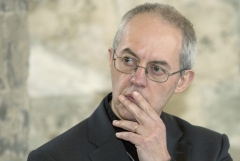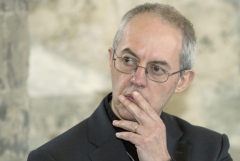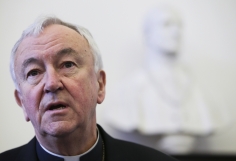
Clergy wife Anne Atkins has described how she and her vicar husband "struggled" to raise four children on his annual stipend of £20,000.
Mrs Atkins adds her voice to the controversy over the living wage with a graphic account of how her husband Shaun gave his life to the Church of England, including 14 years as a vicar in Parsons Green, London. She describes how the family lurched from financial crisis to crisis as he struggled to find a post well-enough paid for his family to survive.
Writing in The Daily Telegraph, she condemns the Church for paying minimal stipends. She also alleges that nervous breakdowns among clergy are "no longer a rarity".
The Church was last week accused of hypocrisy for campaigning for employers to pay staff the living wage of £7.85 while advertising jobs of its own for less, such as at £6.50 an hour.
These were not clergy jobs but the Church has enormous leeway with clergy stipends because technically, Mrs Atkins writes, they are not "employees".
Mrs Atkins writes that the Church had "blasted the trumpet" for social justice. Even when her husband was on just £20,000 a year they had a large and comfortable vicarage and were secure.

"Then in 2004 he was tempted away by a dream post, which, as dreams can, turned into a nightmare," she adds. But he couldn't afford to apply for another job. She cites jobs currently being advertised, such as for a priest-in-charge Alsager, being offered 65 per cent of a stipend which works out at £14,813.50 per annum. Although it is advertised as part-time, the job description lists five days - four days per week plus Sunday.
Other dioceses are offering jobs for "house-for-duty priests" which means a house with no stipend.
She describes how her husband took a new job with the promise of a house that did not materialise. She was given somewhere to live by a friend 500 miles away, while her husband sofa-surfed to continue in his job.
Eventually, her husband was offered a school chaplaincy, and is now paid as a teacher. "For the first time in more than three decades we can live on his salary without help from friends and family."
Mrs Atkins concludes: "I don't blame my beloved Church of England for not having the money; she has been in financial meltdown for years. But perhaps soft-pedal on the motes in others' eyes and not limit concern for social injustice to kiosk workers? One of our sons used to talk of ordination. To my unspeakable relief, he has now decided on a career that might feed his future family – as a freelance bass guitarist."
In 2013/14 the Church's Central Stipends Authority recommended a a minimum stipend of £22,340, a 2 per cent increase on the previous year. Estimated value of clergy housing was £9,950.
Father Alexander Lucie-Smith, a Catholic priest, commented in The Catholic Herald that Catholic clergy are also prone to stress, although their cases differs from the Anglican one in several important respects.
Although they receive minimal amounts in stipends, they are well-looked after by parishes. Also they are celibate and so do not have families to support.
Three years ago Mrs Atkins wrote in the Daily Mail that the stress of her husband's job was so great she even turned to alcohol.
"For the first time, I understood why the homeless people who had turned up so often at our London vicarage were prepared to forgo accommodation for alcohol," she wrote.
Christian Today has requested a comment from the Church of England


















